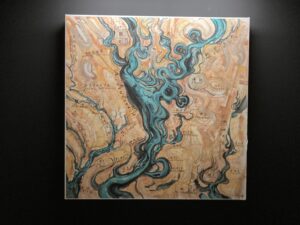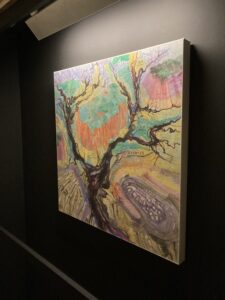Week 10 – Proposal
Good Friday afternoon to y’all. As mentioned in my last post I certainly need some time and inspiration and to jiggle my different research ideas a little bit around, modify them, see how they might align with potential PhD ideas I have (or have seen online). But anyway, I will give it a go – try and summarise a potential “proposal” – while pointing out that this is more of a rough sketch than a proper research proposal.
Research Proposal
Science Communication & AI
Cause and effect of inequalities in science communication in the context of climate change mitigation and the potential added value of AI and Open Data Resources to help fight climate change mitigation.
Introduction
The field of AI is rapidly advancing and seems to provide ample opportunities for innovation (Nowak et al., 2018) as well as concern in the field of datafication such as ethical concerns over personal rights, governance (Olhede & Wolfe, 2018) and how it could infringe on democracy. While concern in the field of AI need to be taken into consideration, this research proposes to look at AI as a new chance of enhancing science communication. Which is a research area that is also becoming increasingly important. The public, as members of a democratic society, need to face, dissect, and make decision in a variety of complex fields such as climate change mitigation, vaccinations, geoengineering and much more. In order to equip inform public debate and equip the public with the tools necessary to face these complex decisions, governments and nongovernmental organisations needs to provide effective science communication (Bruine de Bruin & Bostrom, 2013). Especially in the context of climate change mitigation, research needs to work on how to bridge the current gap knowledge-action gap (Knutti, 2019).
This paper proposed to investigate the cause and effects of inequalities in science communication and how they influence decision-making with regards to climate change mitigations. As a second part, this paper then looks at how AI and Open data resources can add potential value to science communication, decrease inequalities in science communication and potentially increase climate mitigation action.
Literature review
…pending…
Objectives
- To scrutinize existing academic literature on the effective science communication frameworks and to merge it with insights on what role AI and open data resources could play in effective communication practises.
- To analyse various data sets on science communication in order to look for patterns in what the causes and effects of inequalities in science communication are with regards to climate change mitigation.
- To elicit whether the use of AI and open data resources could be helpful to render science communication more effective or whether there are ethical and moral concerns.
- To evaluate the advantages and potential disadvantages.
- To conclude whether, how and to what extend AI and open data resources can help bridge the knowledge-action gap and promote climate change mitigation.
Methods
The proposed methodological approach is quantitative. The researcher will implement a statistical approach to dissect and interpret various databases on science communication and inequalities within it by using the coding skills acquired in semester 1 and 2. Furthermore, existing data and insights into how AI and open data resources can help facilitate science communication will help inform a variety of recommendation for future science communication practise. The research philosophy will be discussed in further depth at a later stage.
Practical componentIMG_2705
As mentioned previously, I would like to merge a classical master dissertation with a creative component to try and use the relative freedom we have been given with our final projects and to expand on my creative skills in addressing complex issues. Therefore, I suggest that I will not only draw theoretical conclusions as part of my research, but visualise the data and conclusions in form of artefacts. These could be computer generated or maybe draw “maps” of the future landscape of science communication, inspiration of the work by Qiu Zhijie. For instance, the choice of colour could be data-driven and represent the percentage of certain findings. Some artwork by Qiu Zhijie can currently be seen in the Tebiot Rice Gallery & some inspirational “reference” photo can be seen below. Here is also a video IMG_2705 of one of the artworks!


References (preliminary reading list):
Bruine de Bruin, W., & Bostrom, A. (2013). Assessing what to address in science communication. Proceedings of the National Academy of Sciences, 110(supplement_3), 14062-14068.
Knutti, R. (2019). Closing the knowledge-action gap in climate change. One Earth, 1(1), 21-23. https://doi.org/10.1016/j.oneear.2019.09.001
Nowak, A., Lukowicz, P., & Horodecki, P. (2018). Assessing artificial intelligence for humanity: Will AI be the our biggest ever advance? Or the biggest threat [Opinion]. IEEE Technology and Society Magazine, 37(4), 26-34.
Olhede, S. C., & Wolfe, P. J. (2018). The growing ubiquity of algorithms in society: implications, impacts and innovations. Philosophical Transactions of the Royal Society A: Mathematical, Physical and Engineering Sciences, 376(2128), 20170364.
General literature of science communication:
Burns, T. W., O’Connor, D. J., & Stocklmayer, S. M. (2003). Science communication: a contemporary definition. Public understanding of science, 12(2), 183-202.
Trench, B. (2008). Towards an analytical framework of science communication models. Communicating science in social contexts, 119-135.
Fischhoff, B. (2013). The sciences of science communication. Proceedings of the National Academy of Sciences, 110(supplement_3), 14033-14039.
Bowater, L. & Yeoman, K. (2012). Science Communication: A practical Guide for Scientists. Wiley Blackwell.
Kearns, F. (2021). Getting to the Heart of Science Communication. Island Press Books.
#lilac




Recent comments